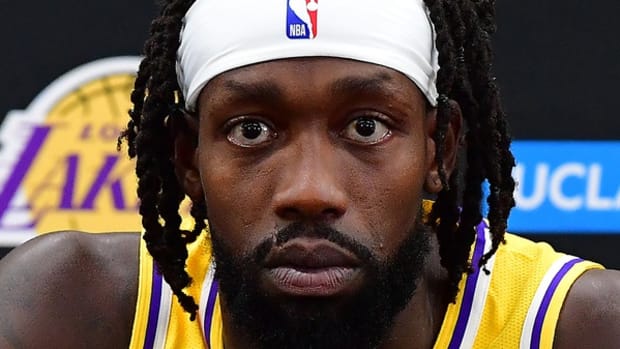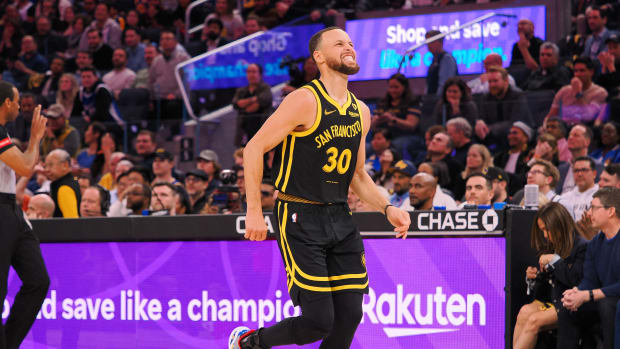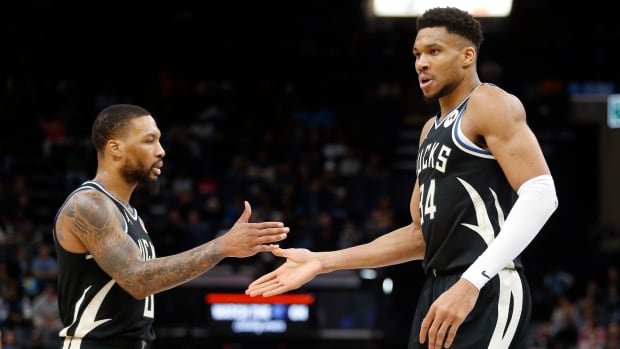Dennis Rodman Needs A Hug
I feel bad for Dennis Rodman. It’s probably because I’m a bit of a mark. But after having watched ESPN’s latest entry in its 30 for 30 documentary series, Rodman: For Better or Worse, an obviously sympathetic portrayal of its namesake, it’s hard not to see Dennis Rodman—the five-time NBA champion, the former Defensive Player of the Year, Donald Trump’s friend, Kim Jong Un’s friend—as a victim of his incredibly challenging circumstances. That’s not to excuse all of Rodman’s behavior, ranging from his domestic violence charge to his self-documented struggles as a father. But the documentary, while not always willing to grapple with some of the more serious issues in Rodman’s life (Does anyone care about his mental health? Was a then-22-year-old Rodman’s friendship with a 13-year-old boy fully examined? Can we talk more about the apparent suicide attempt?) does begin to explain how someone can go from second-round pick, to the greatest rebounder of all time, to singing happy birthday to a ruthless dictator.
Contextualizing Rodman in 2019 is a little bit of a weird exercise. The actions that brought him infamy during his career would probably be viewed somewhat differently in the 21st century. Rodman’s interest in frequenting gay clubs, for example, still wouldn’t be met with pure praise necessarily, but in many ways that would be a much smaller scandal right now than it was in say, 1995. That’s not to act like there wouldn’t be conversation around Rodman’s interests if he were just entering the league this decade. But in the ’90s, there was a certain bombshell, too-hot-for-TV quality to Rodman’s off-court actions (which included wearing a wedding dress to promote his autobiography) that helped create the zoo-animal lens through which he was judged. (Sports Illustrated’s1995 profile of Rodman definitely didn’t help.) Rodman would still be a topic of conversation today, though probably seen as much less scandalous.
“Dyeing my hair, dressing in drag...it all just came naturally to me,” Rodman told The Crossover about that time in his life. “I was probably the only player in the history of sports to build an image by himself. It was all raw and natural, no Nike, no Adidas, no Converse. I would be accepted now. I wouldn’t be as flamboyant now as I was then. I would be one of many.”
Acceptance, and the idea of it, is probably the most important part of Rodman’s life. His success, both personal and professional, seems almost intertwined with it. When his career was at his best, Rodman had a good support system around him. In Detroit, it was Isaiah Thomas and Chuck Daly, who helped make a shy kid from Texas feel like he was part of a family—another thing Rodman had largely lacked for most of his life. As he puts it, he was never hugged as a child. In college in Oklahoma, Rodman befriend the Rich family through their 13-year-old son Byrne, though that relationship eventually deteriorated when, during an argument, Byrne’s mother referred to Rodman as a “n----r,” something she recounts with a seemingly weird satisfaction in the documentary. It wasn’t until Detroit when Rodman was fully embraced, and then again in Chicago, with what Michael Jordan and Phil Jackson lacking in love they made up for in structure.
“If I didn’t go to Detroit, I probably would have been out of the NBA my second or third year,” Rodman says. “I needed to me embraced and cared and loved to keep me safe. The team and city really embraced me so much. If I did anything, people would stand up and cheer. I never got that before. I was so happy, energetic, alive, exuberant. I just wanted to show the love back to people.”
The down periods in Rodman‘s life also seem to go hand-in-hand with acceptance, or a lack of it. The effects of his family breaking up in Detroit—not the first time Rodman had experienced such a sensation—clearly spilled into his unsuccessful stint with the Spurs. Family is obviously such a critical aspect of the Rodman story, something that sticks out even more than the bleached hair or in-your-face piercings. The documentary does not present a flattering portrayal of Rodman as a father. His eldest daughter is brought to tears multiple times discussing her father’s absence from her life. Rodman himself is aware of his failings, but yet can’t seem to bring himself to correct his mistakes. To me, the question becomes, can someone who never experienced something as simple (and as taken for granted) as the unconditional love of a family be expected to act differently?
That’s maybe giving Rodman too much of a pass. And certainly there are many people who have overcome their own challenging backgrounds to have become loving fathers (like LeBron James!), or at least haven’t made multiple trips to visit someone who wants to destroy America. But I see Rodman as the logical extension of someone who seems to have suffered many severe traumas in his life combined with the experience of working in a job (professional sports) in which you’re demanded to push yourself to the limit until people have no use for you anymore. Basketball almost certainly stopped Rodman from going down an even darker path, but the spotlight and pressure that comes with being a famous athlete also added to the toxicity of his life.
We are still seeing this play out in 2019. Rodman could be a lesson, but I’m not sure it’s one that’s been fully realized. Just look at the Antonio Brown situation. Yes, it was dramatic and hilarious and all those things. But the resulting discourse has taken some regrettable turns. People are calling Brown a bad example for children. ESPN’s Mike Greenberg called Brown’s exit from the Raiders the most unprofessional thing he’s ever seen in sports, which is too profoundly dumb for me to think Greenberg could possibly believe. But how many people are asking if Brown is okay? If he has the proper support around him? Antonio Brown was homeless for six months as a high school student, then made himself into one of the most accomplished people in his field through a well-documented relentless work ethic. Now he’s a terrible example for kids?
As far as Rodman goes, even his support for Trump somewhat checks out, at least compared to the soft-focus profiles often given to the largely white voters who hide behind the thin cloak of “economic anxiety.”
“I like Donald Trump,” Rodman says. “I don’t like him as a president, but he’s f-----g cool as f--k. Donald Trump makes me laugh. He tries to be this holier than thou guy, and I kid him about that every time I see him, I don’t look at him like the president, I look at him like a friend. He can carry a torch with me anytime, someone who I can sit down, chit chat, and have a beer with.”
I can’t sit here and say Rodman should continue to support Trump. But I can understand how someone like Rodman specifically, who’s been a loner for most of his life, who’s never really been sure of who cares about him vs. who wants to profit from him, doesn’t want to throw away what he considers a friendship with someone who he knew before his foray into politics. Before there can be a debate about right vs. wrong, there needs to be a better understanding about where Rodman is coming from, the disadvantages he’s faced and the privileges he’s lacked, before he’s dismissed as insane. Rodman can be naive, but he’s not stupid, and that’s a very important distinction.
It’s the dismission of Rodman that bothers me, and is at the heart of why I feel bad for him, and people like him. The frequent characterization of him as insane or bizarre is really troublesome. As much as it seems like his interest in gay culture wouldn’t be a big deal in 2019, the media mostly still doesn’t seem progressive enough to hold back the insults about someone who was once so mentally unwell, he nearly committed suicide outside the building where he said he felt “happy, energetic, alive.”
It’s shi--y that Dennis Rodman has found some measure of solace in the likes of Kim Jong Un and Donald Trump. It’s shi--y that Dennis Rodman hasn’t been a better dad. It sucks that he seemingly approaches the very cusp of realizing why these things are deeply problematic before reverting to bad habits through self-justifications. It’s not that Rodman can’t stand to be a better person. But there are deep pockets of good and generosity within him. Maybe we’d see more of that side if Rodman were more often met a combination of sympathy and empathy as opposed to disgust.



































